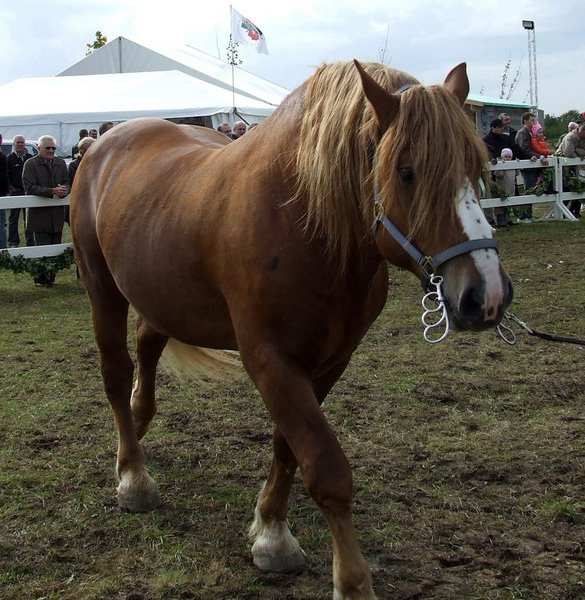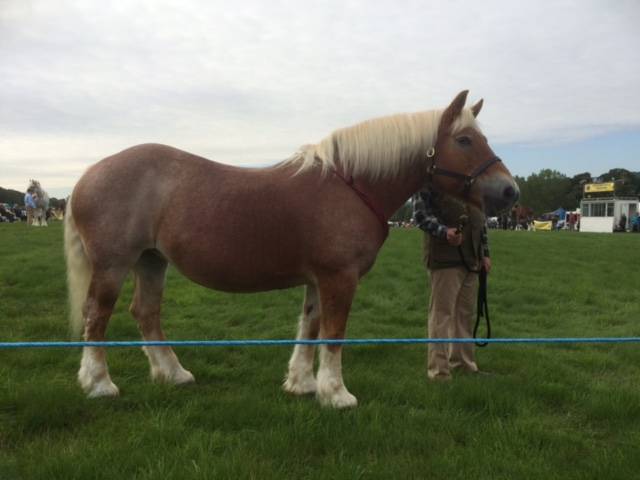Lithuanian Heavy Draft Horses
This breed was developed in Lithuania by  crossing Zhumudka horses with the Swedish Ardennes. The third and fourth generation crossbreds (2nd and 3rd backcrosses) were bred inter se. The breeding began in the early 20th century and the breed was recognized in 1963. In 1964 there were 62,000 Lithuanian Heavy Drafts, in Lithuania.
crossing Zhumudka horses with the Swedish Ardennes. The third and fourth generation crossbreds (2nd and 3rd backcrosses) were bred inter se. The breeding began in the early 20th century and the breed was recognized in 1963. In 1964 there were 62,000 Lithuanian Heavy Drafts, in Lithuania.
The breed has a solid build, large size and harmonious body proportions. The head is coarse, clean cut and large; the neck is short and well muscled; the back is long and sometimes a little dipped; the loin is flat and broad; the croup is broad, long and well muscled; the limbs are solid and properly set. Defects include coarse head, dipped back, pin-toes and sickle-hocked hind legs. The average measurement (in cm) of breeding stallions are: height at withers 160, oblique body length 166, chest girth 205, cannon bone girth 24; mares: 157, 165, 200 and 23 respectively. The commonest colors are chestnut and bay. the stallions' live weight varies from 850 to 920 kg.
 The performance records are as follows: The 2000 m walking Draft record with a pull of 150 kg is 13 min 20 sec; the trotting Draft record for the same distance and a pull of 50 kg is 4 min 45 sec. The Draft endurance with a pull of 300 kg is 1397 m with a maximum pull of 860 kg. The Lithuanian Heavy Draft has good longevity and fairly high fertility. The foal crop at the best studs is 80%; survival rate up to one year of age is 76-79%.
The performance records are as follows: The 2000 m walking Draft record with a pull of 150 kg is 13 min 20 sec; the trotting Draft record for the same distance and a pull of 50 kg is 4 min 45 sec. The Draft endurance with a pull of 300 kg is 1397 m with a maximum pull of 860 kg. The Lithuanian Heavy Draft has good longevity and fairly high fertility. The foal crop at the best studs is 80%; survival rate up to one year of age is 76-79%.
Figure 2. Image provided by Mr. Mark Pearson - Rochester Kent UK.
Their solid build enables Lithuanian Heavy Drafts to display good adaptability to extreme and harsh conditions. When used to improve meat and milk yield in native Altai horses, first crosses and backcrosses had better live weight indices and higher growth rate; they better withstood the conditions of year-round grazing. Crossbreeding of the native Altai and improved horses with the Lithuanian Heavy Draft is being used to develop a new breed. The breed comprises 9 lines. It is bred at Nyamun, Sudav and Zhagar studs and at horse breeding units of collective and state farms.
References
Dmitriez, N.G. and Ernst, L.K. (1989) Animal Genetic Resources of the USSR. Animal Production and Health Paper Publ. by FAO, Rome, 517 pp.
Mason, I.L. 1996. A World Dictionary of Livestock Breeds, Types and Varieties. Fourth Edition. C.A.B International. 273 pp.
